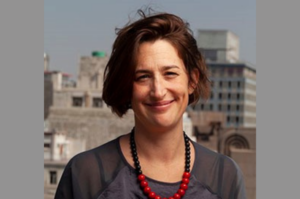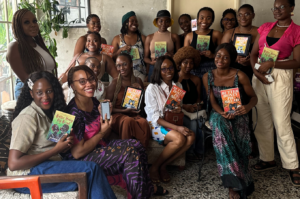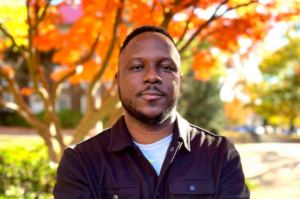
Kalaf Epalanga lives at the intersection of many identities: musical genius, immigrant, writer, among many others. For the 90s/2000s kids of Lisbon, Kalaf was one of the few black musicians on stage representing Portugal, who spoke crioulo, danced kizomba and kuduro, and ate cachupa with gusto. To the rest of world, he was the Sapeur in the MTV Europe Music Award-winning band, Buraka Som Sistema, hyping excited crowds and bringing the unique sounds of Lisbon to the world.
In spite of these successes, he will tell you with a smile, that he is neither a singer or a musician. And there is some truth to this because he is a writer at heart. He is deeply interested in the immigrant experience as well as how culture and history manifest in Lusophone Africa and its relationship with Portugal.
Portugal is never too far in his writing. He is after all the man who tried to buy Lisbon for half price as he relates in one of his books. However it’s his last work, Também os Brancos Sabem Dançar’ <Whites Can Dance Too>, that brings together his love for the Portuguese capital and African music. The novel crosses lands and borders to tell us the story of kuduro’s magic as it metamorphosed, borrowed, inspired and was loved by people across cultures. A musical journey that leaves one with a new playlist that takes you though the sounds of an Angolan musician about to miss his biggest concert, a young Portuguese Kizomba dancer enamored with Lisbon’s African nightlife, and a Norwegian hip hop head whose job as a cop leaves him torn.
This interview took place over the phone. And even though this is not our first phone call, I am always astounded at how he can pick any topic and offer profound insights, but always with a tinge of humor. He has a wealth of knowledge that he shares graciously as he walks me though what it means to be a Black writer writing in Portuguese. We talk about writing, the publishing industry, festivals, racism and of course COVID-19, but he never loses sight of the end goal, the future of Lusophone African writing.
Yovanka Paquete Perdigão
So we are celebrating 10 years of Brittle of Paper. 10 years seems like an interesting number that follows you. You were in the Buraka Som Systema band for 10 years exactly, and it’s also almost 10 years since you published your first book Estórias de Amor para Meninos de Cor (2011). I am curious to know what this decade represents for you as a writer?
Kalaf Epalanga
Indeed, these past ten years have been the source of incredible growth, lots of learning, and time spent learning how to perfect my writing and develop my writing topics of interest. To be honest, I never thought about living a writer’s life. Although my first love was writing, editing books was never something I imagined I would be doing. But since my first book, I started to believe that I belonged to the literary space. It’s what makes me happy as a citizen, as someone interested in social causes such as the place of Africans in the diaspora and the continent. I am not interested in a mainstream audience, but I want to traverse boundaries by writing stories that I didn’t grow up reading. I might have started in music as it was the medium that was more easily accessible for a person like me, but in the last ten years, I came to understand the power of my writing and feel at peace there.
Yovanka Paquete Perdigão
What has this decade represented for lusophone writing?
Kalaf Epalanga
This decade has exposed an enormous deficiency in Lusophone writing. Issues that are not new, but events such as the oil crisis in 2014 made it even harder for small publishing houses to expand. Before the crisis, Luanda was then known as the next Dubai with its rising skyscrapers and money so easily splashed around, but the crisis in conjunction with bad government dismantled these narratives and wrecked many futures. So it’s no surprise that when you are thinking of your next meal, writing is not exactly a priority. Without resources, our writers and publishers weren’t able to be represented in the major literary events on the continent and outside. Translation is not on the agenda of our political institution as ways to introduce our stories to a broader audience. On top of that, Portugal is still the main market for our most celebrated writers, myself included. Our books then arrive in our countries of origin via distribution with prohibitive prices. The fact that most of the profits we make as writers directly contribute to foreign agents and foreign publishing houses who have little interest in finding new voices and developing writing programs on the continent. However, the fragility of our publishing structures combined with a new political climate has pushed many to think more deeply about how we need to build resilient ecosystems. Like the case of Rosa de Porcelana in Cabo Verde, Cavalo do Mar in Moçambique and Ondjaki’s new publishing house Kacimbo in Angola. It’s our responsibility to build these elements so that we have translators, editors, agents in our countries who understand our storytellers.
Yovanka Paquete Perdigão
Besides the lack of a publishing ecosystem in Lusophone Africa, what other roadblocks have stopped Lusophone writers from making their mark during these last 10 years?
Kalaf Epalanga
Readership is one. We don’t have enough readers who are informed and want to buy books from people like us. For me, it all starts with the reader because they are the ones who will visit the bookshops and request certain authors. If the bookshop doesn’t have it, they will be the ones contacting the publishers. For example, I ask myself this question often: would I be as successful if I had not been so known in the music industry in Portugal? Would agents, publishing houses, or newspapers have given me the opportunity to write and publish my stories? There are very few “African literature” events for Lusophone writers to duck under to sell books in Portuguese speaking countries. The lack of integration between writers from the continent and its vast diaspora is a problem. I don’t say this to suggest African writers and their work should only be seen as African literature. After all we want everyone to read us. But it would be advantageous to build a cohesive community of authors and readers because as it is now, for Black writers in Lusophone Africa and Portugal, our chances for an international career are limited. Very few of us get second chances. You have to come out of the gate swinging.The first book has to be spectacular or the grind will be exhausting. It would be fantastic if we get to know African readers first.
Yovanka Paquete Perdigão
2020 came with so many promises. We thought we were moving to fresh starts, new opportunities in this new decade and suddenly Covid-19 hit. And we were left re-examining every aspect of our lives. You spent much of 2019 curating and pouring your energies into the Berlin Book Festival. How did it feel to have to cancel the festival and what did you learn during this time?
Kalaf Epalanga
I learned a lot as I came through the “humble door” (chuckles). My goal was to give emphasis to literature from Portuguese speaking countries in Africa and also Brazil. Knowing that the African literary world focuses essentially on Anglophone and sometimes Francophone literature, before anything else. I had to come in with a dose of humility. Barely anyone knows us authors from those places as we are the last guests of this afro literature party. I visited different festivals like the Stimmen Afrikas Festival in Cologne, Africa Writes in London, FLUP in Rio de Janeiro. I was able to observe and gather ideas about what I wanted to present in Berlin. Luckily, I didn’t have to think of who is published in Europe or not, who is important and must be invited at all costs. I was able to focus on giving a platform to writers whether they were published or not and whether they wrote in English or other languages. The aim was to give these writers platforms to connect with readers, agents, and publishers. But I also became aware that I was not just programming for that year but as part of what is expected to be a long tradition. The festival ultimately has to be successful so that other editions of it can be replicated. Festivals are not easy to put together, just the logistics of flying so many people in and securing sponsorship are two things that require another type of strength. So I learned that I had to balance a lot in order to make this a good festival with the representation I was looking for but also make it a festival that is commercially viable so that the next curators would also have room to maneuver. But now with COVID19 and us having to cancel the festival, a lot of conversations emerged that I had not factored in. For example, the huge disparity between white and black writers when it comes to advances as revealed by #Publishingpaidme or the uphill battle for writers published in the west to have their books accessible in their home countries. These were not concerns that were at the forefront of my mind, but this period has made me dig deeper and want the Berlin Book festival to also take up these conversations.
Yovanka Paquete Perdigão
Why do you think that English speaking Africans have yet to engage with Lusophone writing? It seems that even the literati, the bloggers, the publishers, agents of this world remain shy to Black Lusophone writers.
Kalaf Epalanga
The answer to that is very complex and one can go through many routes to understand this “shyness.” They have had independence, but African countries behave similarly to their colonial counterparts, uninterested in their neighbors despite so much shared history. We are interested in our neighbors when it comes to commercial interests like selling and buying goods, but culturally we are not interested in them. Angola shares borders with Congo, Zambia, and Namibia, much of our culture is influenced by the Bakongo, the Lundas, the Herero, and vice versa, yet our governments are not interested in investing resources to celebrate these cultures and their fusions. We are now paying the price of treating culture as a secondary matter. How Africans are perceived outside of Africa and the ill-treatment received by the diaspora directly correlates in the lack of investment in nurturing our culture and celebrating it. Folks in the diaspora are similarly tethered to these distinctions of Anglophone, Lusophone and Francophone Africas, never going beyond those symbols to reach out and discover how much we are similar to one another. We are resisting re-imagining Africa beyond the colonial narrative, which means as Africans we can only exist in contrast to the other, thus making our existence depending on external validation.
Yovanka Paquete Perdigão
As the COVID crisis deepened, the world also became engulfed with another tragedy, the killing of George Floyd, which later revealed a string of victims of police brutality not just in America but across the world. Although it comes with no surprise that racism is alive and well, what can you tell us about this particular event’s ramifications to Portugal, a country that seldom makes global news when it comes to racism but yet has its own disturbing past and present?
Kalaf Epalanga
The killing of George Floyd certainly resonated with the diaspora in Portugal. We had Black Lives Matter protests in the streets in response to that event. But this also came at a crucial moment of reckoning in Portugal. We had this year for the first time, 3 Black women enter the Portuguese parliament. This really exposed the bias and prejudice in Portuguese society. In the last week of July, a young Portuguese man with Guinea-Bissau descent, Bruno Candé, was killed in broad daylight at the age of 39 by a self-declared racist white man in his 70s. Remember the Salazar dictatorship ended in 1974 around the time the alleged killer became an adult during. He allegedly fought in our countries to keep colonialism and yet the media and public opinion are struggling to admit that this a horrendous act of racism when a witness heard him shouting racists slurs. Ultimately, how Portugal debates race directly correlates how Portuguese people understand their place in history. The Portuguese “explorer“ Vasco da Gama is considered a hero and the Lusíadas by Camões is a national treasure. A country that considers these as its most precious and defining aspects of their national identity will undoubtedly struggle to accept that its heroes had blood in their hands, that the street names in Lisbon are homages to some of the cruelest and most vicious man in Portuguese history. In Portugal, people have recognized and talked about the horrors of Salazar’s regime, but, at the same time, pretend to not know of the murky pasts of other historical figures when it comes to colonialism. Even the account on how democracy was established downplays the role of the African liberation movements in our countries. It was after the Portuguese retreated from Guiné-Bissau that the Salazar regime came to an end. The country was bankrupt and the military was tired of the gruesome and long colonial wars in Angola and Mozambique. In short, all of Europe needs collective therapy to discuss what they did and what they are doing to face the consequences of colonialism and imperialism today. However, Portugal is still not ready for that.
Yovanka Paquete Perdigão
What do you wish to see in the next ten years for Lusophone writing?
Kalaf Epalanga
It goes back to the beginning. I want to see more black publishing houses, agents, translators, editors nurturing the next wave of Lusophone writers who, hopefully, will be more established and create partnerships across the continent. I want foreign publishers of black writers to be truly engaged in dismantling systemic racism, whether that’s by challenging themselves to create programs that are not just for diversity’s sake but to share their knowledge so that new generations can go on to also create their own literary ecosystems. “The future is Africa” shouldn’t just be a feel-good tagline for companies and individuals that profit from the art and culture produced by sons and daughters of Africa. I hope the next 10 years will be a decade of honest partnership and collaboration. So giving back the copyrights of our stories will be a decent gesture to start writing the next chapters of the literature in the Africas.









Mutaleni Nadimi November 09, 2020 07:11
Fantastic interview. Thanks to Yovanka for asking open ended questions allowing Kalaf to openly discuss the struggles and triumphs of the African literary landscape. I’m especially thankful for the insight into Afro-Lusophone literature - a common blindspot for many of us.